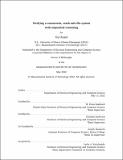Verifying a concurrent, crash-safe file system with sequential reasoning
Author(s)
Chajed, Tej
DownloadThesis PDF (1.124Mb)
Advisor
Kaashoek, M. Frans
Zeldovich, Nickolai
Tassarotti, Joseph
Terms of use
Metadata
Show full item recordAbstract
Critical systems software such as the file system is challenging to make correct due to the combination of concurrency in the implementation for good performance and the requirement to preserve data even on crash, where the whole computer stops and reboots unexpectedly. To build reliable systems, this thesis extends formal verification — proving that a system always meets a mathematical specification of its behavior — to reason about the concurrency and crash safety.
The thesis applies the new verification techniques to the verification of DaisyNFS, a new concurrent file system. The file system is an important service of an operating system, because nearly all persistent data is ultimately stored in a file system and bugs can lead to permanent data loss in any application running on top. Another contribution of the thesis is a system design and verification techniques to scale verification to a system of the size and complexity of a file system. In particular, the file system is designed around a transaction system that addresses the core challenges of crashes and concurrency, so that the rest of the code can be verified with comparatively simpler sequential reasoning.
An evaluation of proof overhead finds that verification required 2× as many lines of proof as code for the sequential reasoning, compared to 20× for the crash safety and concurrency proofs. A performance evaluation finds that DaisyNFS achieves good performance compared to Linux NFS exporting ext4 over a range of benchmarks: at least 60% the throughput even on the most challenging concurrent benchmarks, and 90% on other workloads.
Date issued
2022-05Department
Massachusetts Institute of Technology. Department of Electrical Engineering and Computer SciencePublisher
Massachusetts Institute of Technology